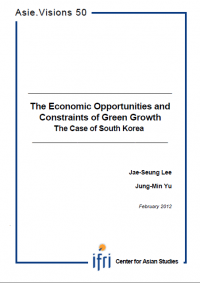Gateway to Think Tanks
| 来源类型 | Publications - Policy Papers - Asie Visions |
| 规范类型 | 简报 |
| DOI | 978-2-86592-991-7 |
| The Economic Opportunities and Constraints of Green Growth: The Case of South Korea Asie.Visions, No. 50, February 2012 | |
| Jae-Seung LEE, Jung-Min YU | |
| 发表日期 | 2012-02-16 |
| 出处 | Asie Visions |
| 出版年 | 2012 |
| 概述 | The Green Growth Policy in South Korea has symbolized a paradigm shift to cope with climate change, fossil fuel depletion, and global economic recession. The emerging paradigm stands to create new engines for economic growth through green technology and clean energy. The government recently... |
| 摘要 |
The Economic Opportunities and Constraints of Green Growth: The Case of South Korea Asie.Visions, No. 50, February 2012
The Green Growth Policy in South Korea has symbolized a paradigm shift to cope with climate change, fossil fuel depletion, and global economic recession. The emerging paradigm stands to create new engines for economic growth through green technology and clean energy. The government recently unveiled the Roadmap of Green Energy Strategy 2011 (2011-2030) that aims to position Korea as a world leader in the green energy industry.  To this end, 15 green technologies were chosen as priorities for governmental support. A number of green growth policies, such as the emission trading system, the Green Homes Project and the Renewable Portfolio Standard, are expected to provide a stable framework for domestic market expansion. In addition, the government R&D investment plan is expected to play an important role in filling a technological gap between South Korea and leading countries in green energy. The nation's well-developed industrial foundation in areas such as technology and infrastructure will be an advantage that can be easily applied to the green energy industry. Furthermore, the nation's advanced IT and electronic technology firms have entered the smart-grid business. Based on strong political support and policy measures, South Korea's green growth policy has showed noticeable progress in a short period of time. However, the biggest challenges are technological dependency and growing competition in the global market. Also, the transition from a hydrocarbon-based economy to a renewable-based one could bear a huge economic and social cost. The speed of the transition, as well as a series of external variables - such as the global economic condition - will also affect the progress of green growth in South Korea.
The Economic Opportunities and Constraints of Green Growth: The Case of South Korea
|
| 关键词 | Economic Policy Environment Industry low-carbon technologies Research and Development South Korea |
| URL | https://www.ifri.org/en/publications/enotes/asie-visions/economic-opportunities-and-constraints-green-growth-case-south-0 |
| 来源智库 | French Institute of International Relations (France) |
| 引用统计 | |
| 资源类型 | 智库出版物 |
| 条目标识符 | http://119.78.100.153/handle/2XGU8XDN/415604 |
| 推荐引用方式 GB/T 7714 | Jae-Seung LEE, Jung-Min YU. The Economic Opportunities and Constraints of Green Growth: The Case of South Korea Asie.Visions, No. 50, February 2012. 2012. |
| 条目包含的文件 | ||||||
| 文件名称/大小 | 资源类型 | 版本类型 | 开放类型 | 使用许可 | ||
| couverture_av50.png(31KB) | 智库出版物 | 限制开放 | CC BY-NC-SA |  浏览 | ||
| asie.visions_50_lee_(626KB) | 智库出版物 | 限制开放 | CC BY-NC-SA | 浏览 | ||
除非特别说明,本系统中所有内容都受版权保护,并保留所有权利。